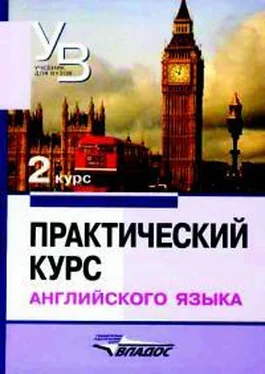comfort
Ant. discomfort
comfort υt утешать, успокаивать
comforting adj утешительный, успокоительный, е.g. comforting words.
Note: convenient adj means suitable, handy, serving to avoid trouble or difficulty; е.g.
convenient time, method, tool, place, etc. Will this bus be convenient to/for you? Let's arrange a
convenient time and place for the conference.
Ant. inconvenient
convenience n 1. удобство (the quality of being convenient or suitable), е.g. at your earliest
convenience; for convenience; 2. (pl.) удобства (device, arrangement, etc. that is useful or
convenient, е.g. central heating, hot water supply), е.g. The house has all modern conveniences. Ant.
inconvenience
5. to run (ran, run) υi/t 1. бежать, бегать, е.g. 1 ran all the way for fear of being late. As
soon as we fired, the enemy ran.
2. ходить, плыть, курсировать (о трамваях, автобусах и пр.), е.g. Trams run on rails.
Motor cars ran along ordinary roads. The buses run every five minutes.
3. течь, литься, е.g. Torrents of water ran down the streets. Rivers run into the sea. Don't you
hear the water running in the kitchen? If you have a bad cold, your nose runs.
4. тянуться, е.g. For several miles the road ran across a plain.
Note:For the Russian тянуться = простираться the verb stretchis used, е.g. The forest
stretched to the South for many miles.
5. гласить, рассказывать, говорить(ся), е.g. So the story runs. The story runs ....
to run into smb.случайно встретиться с кем- n .; to run into smth. натолкнуться на что-
л., е.g. Our car ran into the bus. I ran into a friend of mine on my way-home.; to run across
smb./smth.случайно встретить (натолкнуться на что-л.), е.g. The other day I ran across a very
interesting article in the newspaper.: to run over smb.переехать, задавить кого-л., also: to be run
over(by a car), е.g. But for the skill of the driver the man would have been run over by the bus.
runner n бегун
6. join υt/i 1. соединять(ся), объединяться), е.g. I couldn't join (together) the two halves of
the vase, because a small piece was missing. Where do the two streams join (each other)?
Syn. unite
N о t e: to joinusu. means "to put two things together", е.g. The island was joined to the
mainland with a bridge.; to uniteusu. means "to join together (by a common aim or bond) several
objects so as to form one new unit", е.g. We united all our forces to drive the enemy out of our
country. Workers of the world, unite! The United Nations Organization (UNO) was formed in 1945
in San Francisco.
2. присоединяться (к), е.g. Will you join me in my walk? We'll join you in a few minutes.
3. входить в компанию, вступать в члены, е.g. If I were you I should join this club. He was
twenty-two when he joined the array.
7. depend υi 1. зависеть от (on/upon smb. for smth.), е.g. We depend on the newspapers for
information about world events. He depends on his sister for a living. Children usually depend on
their parents (находятся на иждивении родителей).; 2. полагаться, рассчитывать на кого-л., что-
л., е.g. You can depend upon the man. I depend on you to do it. Can I depend on this time-table or is
it an old one?
It (all) dependsкак сказать; в зависимости от обстоятельств, е.g. Will you finish your
work on time? — It depends.
NOTES ON SYNONYMS AND ANTONYMS
1. Synonymsare words expressing the same notion, but differing by certain additional
characteristics. E.g. to look, to stare and to gaze express the same notion of turning one's eyes on
something or somebody, but stare and gaze differ by their emotional colourings (see item 1 of
Vocabulary Notes) whereas look describes the notion generally, without any additional
characteristics. Such a general word in the group of synonyms is called the synonymic dominant.
To glance is another synonym of this group which differs from the rest of them by duration: it
means looking at something briefly, passingly, a moment only.
2. Antonymsare words with contrasted meanings. E. g. different — alike; convenient —
inconvenient; love — hate; up — down.
ESSENTIAL VOCABULARY (I)
Words
chorus n , υ
differ υ
join υ
comfort n , υ
difference n
look n , υ
comfortable adj
different adj
rest n , υ
convenience n
gaze n, υ
run υ
convenient adj
headmistress n
stare n, υ
depend υ
unite υ
Word Combinations
to fix one's eyes on/upon smb.
to keep an eye on smb.
to feel helpless
to give (send) a message
to give a smile (a nod, a look, etc.)
to turn one's eyes (gaze)
to bear (to have) a strong
upon smb./smth.
resemblance to
to run across
to motion to smb.
to run into
to give out (pencils, leaflets, readers,
to run over
workcards, sets of material, etc.)
to shout smb. down
to call the register (the roll)
to abandon hope
EXERCISES
I. Read the test and talk on the following points (A. Grammar, B. Word usage):
A.1. Why is the Present Perfect used in "... as soon as you've called the register"? 2. Why is
the Past Perfect Continuous used in "... who had been crossing and uncrossing his eyes in an ugly
manner ..."? 3. Why is the Present Indefinite used in "... till you join us"? and in "If there's anything
that puzzles you ..."? 4. Tick off all the sentences with the oblique moods. Translate them.
B.Pick out all the words and phrases describing the children's actions.
II. Read the following words with silent t, p, gh. Memorize them:
hasten, fasten, listen, Christmas, castle, whistle, jostle, nestle, wrestle; cupboard, pneumonia,
psychology, raspberry; neighbour, nightingale, straight, naughty, high, height, through, sigh.
III. a) Write the Past Indefinite and Past Participle of the verbs:
grow, creep, bear, break, keep, think, leap, mean, fall, find, feel, say, cling, hear, meet, run,
Читать дальше





![Владимир Аракин - Практический курс английского языка 3 курс [calibre 2.43.0]](/books/402486/vladimir-arakin-prakticheskij-kurs-anglijskogo-yazyk-thumb.webp)






